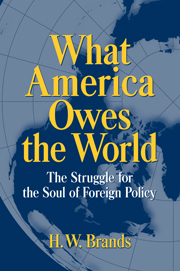Book contents
- Frontmatter
- Contents
- Preface
- 1 Exceptionalists All! The First Hundred Years
- 2 Brooks Adams: Marx for Imperialists
- 3 Walter Lippmann and a New Republic for a New Era
- 4 When the Future Worked and the Trains Ran on Time: Lincoln Steffens
- 5 Dr. Beard's Garden
- 6 Kennan, Morgenthau, and the Sources of Superpower Conduct
- 7 Reinhold Niebuhr and the Foreign Policy of Original Sin
- 8 God Blinked but Herman Didn't
- 9 On Wisconsin: Madison and Points Left
- 10 The Brief of Norman's Woe: Commentary and the New Conservatism
- 11 It Ain't Over till It's Over – and Not Even Then
- Note on Sources
- Index
2 - Brooks Adams: Marx for Imperialists
Published online by Cambridge University Press: 25 March 2010
- Frontmatter
- Contents
- Preface
- 1 Exceptionalists All! The First Hundred Years
- 2 Brooks Adams: Marx for Imperialists
- 3 Walter Lippmann and a New Republic for a New Era
- 4 When the Future Worked and the Trains Ran on Time: Lincoln Steffens
- 5 Dr. Beard's Garden
- 6 Kennan, Morgenthau, and the Sources of Superpower Conduct
- 7 Reinhold Niebuhr and the Foreign Policy of Original Sin
- 8 God Blinked but Herman Didn't
- 9 On Wisconsin: Madison and Points Left
- 10 The Brief of Norman's Woe: Commentary and the New Conservatism
- 11 It Ain't Over till It's Over – and Not Even Then
- Note on Sources
- Index
Summary
As the nineteenth century drew to a close, two ideas seized American politics. The first was progressivism, which posited a need for reforming the American system of governance to correspond to the changed economic and social conditions wrought by industrialization. The second was imperialism, which proclaimed a civilizing mission for America to the world at large. To some degree, imperialism was simply the manifestation in foreign affairs of the progressive mindset. The progressives intended to remake American society in their own image, as a paragon of education, efficiency, and middle-class values; in the bargain, they would consolidate their political power at the expense of urban bosses and others beyond the pale of their approval. The imperialists aimed to accomplish a similar double-play in the territories the country acquired abroad: While uplifting the benighted, America would secure access to markets, investment opportunities, and positions strategic to the defense of American interests.
Not surprisingly, the personnel of the two movements overlapped. The first progressive president, Theodore Roosevelt, epitomized American imperialism in word and deed. Woodrow Wilson, whose presidency marked the progressive apogee, was no less an imperialist than Roosevelt, although it took Wilson, America, and the world some time to recognize that fact. Imperialist-progressives occupied humbler positions as well – in the cabinet departments and Congress, in the colonial administrations of the Philippines and Puerto Rico, in editorial offices around the United States, in academia, and wherever people pondered how the planet might be improved.
- Type
- Chapter
- Information
- What America Owes the WorldThe Struggle for the Soul of Foreign Policy, pp. 22 - 46Publisher: Cambridge University PressPrint publication year: 1998



